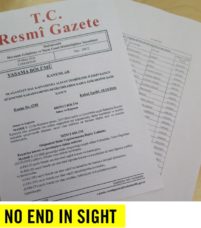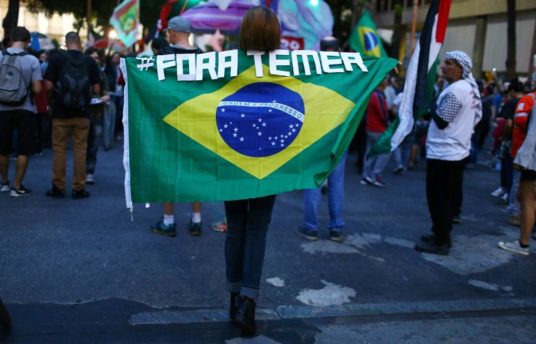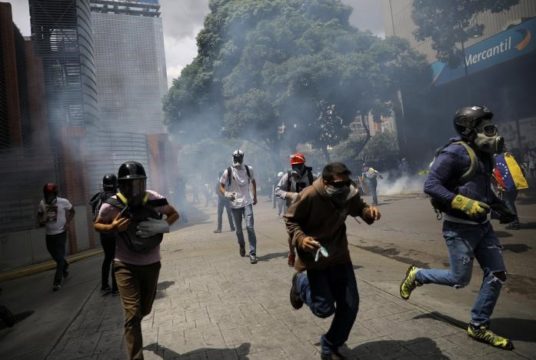|
|
This week in: Peace & Security Publications |
IPSI | Africa | Americas | East Asia | Middle East | South Asia
|
|
|
|
|
|
This week in Peace & Security Publications
|
|
|
|
|

Issues & Insights – Vol. 17 No. 9 – The Third Meeting of the CSCAP Study Group on Nonproliferation and Disarmament in the Asia-Pacific
Adherence to Non-proliferation and nuclear security instruments by Asia-Pacific states has improved but implementation still lags behind in many states. Implementation gaps stem from lack of capacity, lack of awareness, and/or lack of political will. CSCAP and the ARF should focus on…
|
|

“It’s a Men’s Club” Discrimination Against Women in Iran’s Job Market
Women in Iran confront an array of legal and social barriers, restricting not only their lives but also their livelihoods, and contributing to starkly unequal economic outcomes. Although women comprise over 50 percent of university graduates, their participation in the labor force is only…
|

NO END IN SIGHT: PURGED PUBLIC SECTOR WORKERS DENIED A FUTURE IN TURKEY
This report focuses on the arbitrary dismissal of more than 100,000 public sector employees dismissed under the decrees. Those dismissed include members of the armed forces, police officers, teachers, doctors, academics and people working at all…
|
|
|
|
|
|
|
IPSI Summer Symposiums in Bologna and Sarajevo. Spots filling quickly, apply online now.
|
|
|
|
|
|
This week in Sub-Saharan Africa
|
|
|
|
|
ETHIOPIA: First African to head WHO
On Wednesday, Ethiopia’s Tedros Adhanom Ghebreyesus was elected as the first African to lead the United Nation’s World Health Organization (WHO). Ghebreyesus, Ethiopia’s former health minister, won after three rounds of voting by the 186 member states, beating out UK’s David Nabarro and Pakistan’s Sania Nishtar, among others. He will begin his five-year term on June 30. He announced his priority will be universal health coverage, noting that only half of people worldwide have access to healthcare. Comment: Despite Ghebreyesus’ widespread support throughout Africa, his election was controversial with some critics, both within Ethiopia and internationally, claiming he played a role in covering up three cholera epidemics in Ethiopia. Ghebreyesus follows Hong Kong’s Margaret Chan, who served 10 years in the position and has been criticized for WHO’s slow response to the Ebola epidemic in West Africa beginning in 2013. (Al Jazeera, BBC, Reuters)
|
|
|
|
|
|
SOMALIA: First attack claimed by self-proclaimed Islamic State
On Tuesday, the self-proclaimed Islamic State claimed responsibility for its first suicide bombing in Somalia. The suicide bomber detonated at a checkpoint in the northeastern city of Bosasso in Somalia’s semi-autonomous state of Puntland, killing five people and injuring 12 more. Comment: Somalia-based al-Shabbab claims responsibility for the majority of the frequent bombings in the country, most of which occur in the capital of Mogadishu. International news sources state that self-proclaimed Islamic State-linked militants who have split from al-Shabbab are an increasing threat in Puntland. (AfricaNews, AP, Reuters)
|
|
|
|
|
|
SOUTH AFRICA: Mass demonstrations against gender-based violence
On Saturday, hundreds of protestors, most of them men, marched in the capital of Pretoria against the country’s increasing violence against women and children. The crowd followed a barefoot woman dressed in white who the organizers, a group called #NotInMyName, said represented all the women who have suffered abuse by men. The ruling African National Congress party called the rising violence against women “senseless and barbaric” while the opposition Democratic Alliance party condemned the government’s “failure to make South Africa safe for all.” Comment: The march follows the recent rape and murder of a 3-year old girl. According to reported figures, one woman is killed in South Africa by a known person every eight minutes. (Africa News, AllAfrica, Al Jazeera, Deutsche Welle)
Researched/Written by Jessica Himelfarb
|
|
|
|
|
|
|
This week in the Americas & Caribbean
|
|
|
|
|
BRAZIL: Protests against President Temer turned violent
 |
|
On Wednesday, almost 35,000 demonstrators descended on Brasilia setting fires to 7 Ministry buildings, forcing evacuations, and causing extensive damage to other government buildings. Protesters demanded Brazilian President Michel Temer be ousted after the emergence of an audio recording that appears to catch his approving a bribe to purchase the silence of imprisoned former House Speaker Eduardo Cunha. The Audio was released by newspaper O Globo last week. The protest ended in violent clashes with the military police (MP) that were called upon by Temer to restore order. Comment: Michel Temer took office following the corruption-driven impeachment of former president Dilma Rousseff last August. Today, he not only stands accused of approving a bribe to buy the silence of Eduardo Cunha, who is serving a 15-year sentence for corruption, but also of receiving millions of dollars in bribes as part of the expansive corruption scandal known as Lava Jato, or Car Wash. (Folha de Sao Paulo, O Globo, El Nuevo Herald, BBC, Reuters)
|
|
|
|
|
|
UNITED STATES: Trump’s budget proposal cuts aid for Latin America
On Tuesday, the US Department of State presented the budget proposal for 2018, which includes a USD 614 million reduction in aid for the Latin America region. The proposed budget will cause the amount spent on security and drug trafficking in Mexico to be cut by 45.3 percent. The budget proposal contains similar cuts to aid to other countries, including Guatemala Honduras and El Salvador A Venezuelan program to strengthen good governance and respect for democracy will also be cut, while the Peace Colombia program will see a 36 percent reduction, a loss of USD 140 million in aid. Comment: The proposed budget contradicts the official narrative of aid to the region through limiting the combating criminal organizations and strengthening border security. The States Department budget bill could be modified as it makes it way through Congress. (Infobae, El País, BBC, Colombia Reports)
|
|
|
|
|
|
VENEZUELA: Demonstrator set alight as protests continue
|
 |
On Saturday, a protester was set on fire on the 50th day of increasingly violent, ongoing street demonstrations in Venezuela, demanding President Maduro to step down. Venezuelan President Nicolás Maduro has accused opposition demonstrators of setting alight Orlando José Figuera Zaragoza. The man suffered burns on 80 percent of his body from being engulfed in flames, and official sources say he was also stabbed. On the same day, an opposition activist, Edy Alejandro Teran Aguilar, was shot dead, bringing the total number killed in recent protests to more than 50. Comment: The protests against the government began in late March after the Venezuelan Supreme Court dissolved the opposition-controlled congress. The opposition has manifested themselves against the use of violence, as well as denounced repression and excessive use of force on behalf of the government security forces. The government has publicly expressed their support to the Bolivarian National Guard, accusing demonstrators and the opposition of being terrorists. (Noticias Caracol, El Nuevo Herald, Al Jazeera, BBC, 1, 2, Reuters)
Researched/Written by Silvina Zbikoski
|
|
|
|
|
|
|
This week in East Asia & Pacific
|
|
|
|
|
MYANMAR: New round of peace talks under way
On Wednesday, peace talks began between the leaders of a number of armed groups and Aung San Suu Kyi, the State Councilor for Myanmar, in Naypyidaw. The peace talks are aimed at ending decades of fighting by various ethnic groups fighting for greater autonomy. This week’s meeting is the second round of peace talks since the civilian government came to power in Myanmar. Although rebel groups are not expected to sign the National Ceasefire Agreement, the agenda will cover the possibility of a federal union. Comment: Aung San Suu Kyi’s party took power more than a year ago and has been pursuing peace policy over civisms of slow progress. Fighting between Myanmar’s military and ethnic rebel groups have plagued Myanmar for decades through perpetual civil wars. (Channel News Asia, Reuters, Al Jazeera)
|
|
|
|
|
|
PHILIPPINES: Martial law declared in southern Philippines
On Wednesday, President Rodrigo Duterte declared martial law on the southern island of Mindanao following a deadly gun battle between gunmen and government forces. Around 100 fighters laid siege to the city of Marawi, burning a Catholic church, city jail, and two schools as well as occupying bridges leading into the city. The gunmen are suspected members of Abu Sayyaf and Maute, two groups that pledged allegiance to the self-proclaimed Islamic State. On Thursday, air strikes were launched against the suspected terrorists. Comment: President Duterte announced martial law on Tuesday from Russia, cutting his trip to Russia short in light of the events. The emergency declaration took immediate effect and will last for 60 days. (Al Jazeera, BBC, The Guardian)
|
|
|
|
|
|
>TAIWAN: Top court rules in favor of same-sex marriage.
On Wednesday, Taiwan’s top court judges ruled in favor of same-sex marriage, giving parliament two years to amend existing laws or pass new legislation. The court ruled that current laws violate the right to equality by preventing same-sex couples from marrying and are unconstitutional. LGBT advocates hope that current marriage laws will be amended in order to extend equal rights to same-sex couples, fearing that parliament might pass new legislation that recognizes same-sex marriage, but does not grant equal rights. Comment: Wednesday’s ruling paved the way for Taiwan to become the first country in Asia to legalize same-sex marriage. (Al Jazeera, BBC, The Guardian)
Researched/Written by Kanstantsin Ivanou
|
|
|
|
|
|
|
This week in Europe & Central Asia
|
|
|
|
|
AUSTRIA: Turkey vetoes NATO cooperation with Austria, rules changed
On Tuesday, NATO reached a deal to break its deadlock over cooperation with Austria due to Turkey’s veto. Turkey vetoed collective cooperation with Austria, a non-member partner, after the country called for the EU to halt membership talks with Turkey. To bypass the veto, NATO members changed the organization’s rules so that cooperation is planned on an individual basis rather than as a collective, which will allow Turkey to refuse to work with Austria but allow other NATO members to do so. Comment: Austria has maintained its neutral status since an accord between the U.S. and Russia during the Cold War. Turkey boasts the second largest military in the NATO alliance, after the U.S. (Euractiv, BBC, RT)
|
|
|
|
|
|
FRANCE: President Macron seeks to extend emergency powers
On Wednesday, the recently elected President Emmanuel Macron announced that he is seeking to extend the state of emergency set to last from July 15 to November 1. The decision comes after a security meeting held to discuss the implications of the Manchester Arena terrorist attack. The emergency powers grant police forces and administrative authorities wider search and arrest powers under circumstances that would normally require a warrant. Comment: The state of emergency was originally introduced following the Paris terror attacks in November 2015 and has already been extended five times. The emergency powers have led to many arrests and weapon seizures, but have been criticized by Human Rights Watch (HRW) as unfairly targeting French Muslims of North African descent. (France 24, The Local fr, HRW, Reuters)
|
|
|
|
|
|
MONTENEGRO: Montenegro joins NATO despite Russian protest
On Thursday, Montenegro formally became the 29th NATO member during the NATO summit meeting. Last month, Russia, who supported Montenegro’s independence referendum and has invested heavily in the country, condemned the option as “profoundly erroneous.” Comment: Despite Montenegro’s small size, it is a key strategic ally in the Balkans, allowing NATO to control the vast majority of the Adriatic coastline and the northern coast of the Mediterranean. Russia previously attempted to use the coast of Montenegro as a naval base in 2013, but after pressure from NATO Montenegro denied them use. (Anadolu Agency, b92, Reuters)
|
|
|
|
|
|
UK: Prime Minister to confront U.S. President over information leaks
On Thursday, British police stopped sharing information with the United States regarding Monday’s Manchester Arena terrorist attack after leaks to the U.S. media risked compromising the investigations. UK Prime Minister Theresa May announced she will tell U.S. President Donald Trump that intelligence shared between the countries must remain secure. The leaks on Wednesday included forensic photographs of the bomb site and the name of the suspected terrorist. Comment: The UK considers the U.S. its closest ally on security and intelligence, and the two countries routinely share information freely. President Trump was recently criticized for sharing classified information with Russian diplomats, against the request of the unknown country that provided the intelligence. (BBC, Reuters 1, 2, AP)
Researched/Written by Kenneth Davis
|
|
|
|
|
|
This week in the Middle East & North Africa
|
|
|
|
|
IRAN: Rouhani wins presidential elections
On Saturday, Iran’s incumbent President Hassan Rouhani won 57 percent of votes against rival Ebrahim Raisi. More than 40 million Iranians voted in the election. Rouhani is popular for his policy of reducing Iran’s international isolation and promise to rebuild the economy. He has pledged to continue to open Iran to the rest of the world and deliver the freedom its people call for. Comment: Rouhani’s win comes after his attempt to frame the vote as one between greater civil liberties and extremism. In 2015, Rouhani negotiated with world powers for the Iran Nuclear Deal, curbing the country’s nuclear program in exchange for sanctions relief. His reelection is likely to safeguard the 2015 agreement. (Al Manar, Al Jazeera 1, 2, Haaretz)
|
|
|
|
|
|
LIBYA: Attack on airbase kills 141
On Friday, an attack on Bark al-Shati airbase in southern Libya killed 141, including soldiers loyal to General Khalifa Haftar and civilians who worked on the base. The Libyan National Army has stated that militias loyal to the UN-backed Government of National Accord (GNA) carried out the attack, but the GNA denied ordering the attack and has set up a commission of inquiry to investigate the allegations. The GNA’s defense minister Mahdi al-Barghathi and head of the Third Force Militia, Jamal al-Treiki – accused of carrying out the attack – have both been suspended pending the investigation. Comment: This attack threatens reconciliation talks, in which leaders of both parties have agreed to put an end to the violence. (The Libya Observer, Al Masdar News, Al Jazeera)
|
|
|
|
|
|
Saudi Arabia: US and Saudi Arabia sign USD 110 billion arms deal
On Friday, during President Donald Trump’s first day in Saudi Arabia, the two nations signed a USD 110 billion arms deal. The arms agreement is intended to help Saudi Arabia deal with “malign Iranian influence and threats,” and support the long-term security of Saudi Arabia and the entire gulf. The agreement includes arms and missile defense systems that President Obama was not willing to sell to the Saudis. The White House has stated “that it feels President Obama ‘abandoned’ Saudi Arabia and this region, and want the whole world to know that now they are getting things back on track.” Comment: The arms agreement is part of wider trade deals totaling USD 380 billion. (Saudi Gazette, Arab News, Al Jazeera)
Researched/Written by Raghda Karajah
|
|
|
|
|
|
BANGLADESH: Chevron threatens to fire workers protesting sale of assets to China
On Tuesday, in response to employee protests, Chevron sent a letter to its employees warning that refusal to comply with their supervisor’s orders would result in disciplinary action and possibly termination. More than 600 employees have refused to do work related to the company’s sale of three gas fields in Bangladesh to Chinese-held Himalaya Energy, which the employees claim is illegal. Under Bangladeshi law, the government has the right of first refusal in the sale of Chevron’s assets and the employees’ union leaders claim Chevron did not comply with the law. Comment: The deal totals USD 2 billion. The purchase of the gas fields by Himalaya Energy, a consortium consisting of state-owned China Zhenhua Oil and CNIC Corp, would be China’s first major energy deal in Bangladesh – where China has already been investing to counter Japanese and Indian influence in the region. (Dhaka Tribune, The Independent, Reuters)
|
|
|
|
|
|
NEPAL: Prime minister resigns after nine months in office
On Wednesday, Prime Minister Dahal resigned, fulfilling the power-sharing agreement between his party, Communist Party of Nepal, and the Nepali Congress Party, in which the two agreed to switch prime ministers after nine months. In a statement, Dahal said he decided to honor the commitment he had made. Legislators are required to wait a week before electing a new prime minister in parliament, as no party has an absolute majority. Comment: Sher Bahaur Duba, the head of the Nepali Congress Party, is expected to replace Dahal marking the first switch between the two parties. A new leader will most likely be chosen before June 14, when Nepal will hold its second round of local elections. (The Kathmandu Post, The Indian Express, Al Jazeera)
Researched/Written by Kenneth Davis
|
|
|
|
|
|
PAKISTAN: Anti-army social media accounts under investigation
On Monday, a security official announced that 200 social media accounts are under investigation for criticism of Pakistan’s military. Interior Minister Nisar ordered a crackdown on online commentary of the military and other security institutions after a newspaper published a report including leaked details from a high-level security meeting. A senior official at the Federal Investigation Agency (FIA) said that the list of suspects active against national institutions is long, and they have already identified 18 users of the 200 accounts under scrutiny. Comment: Activists critical of the military have disappeared under questionable circumstances in the past. In January, five activists disappeared and only four returned. One claimed that an intelligence agency was responsible for his kidnapping though he did not name the specific agency. (Dawn, Hindustan Times, Reuters)
|
|
|
|
|